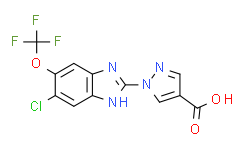| Cas No.: | 1193383-09-3 |
| Chemical Name: | 1-[6-chloro-5-(trifluoromethoxy)-1H-benzimidazol-2-yl]pyrazole-4-carboxylic acid |
| Synonyms: | 1-[6-chloro-5-(trifluoromethoxy)-1H-benzimidazol-2-yl]pyrazole-4-carboxylic acid;1-[6-Chloro-5-(trifluoromethoxy)-1H-benzimidazol-2-yl]-1H-pyrazole-4-carboxylic acid;JNJ-42041935 |
| SMILES: | OC(C(C=N1)=CN1C2=NC3=CC(Cl)=C(OC(F)(F)F)C=C3N2)=O |
| Formula: | C12H6N4O3F3Cl |
| M.Wt: | 346.649 |
| Purity: | >98% |
| Sotrage: | 2 years -20°C Powder, 2 weeks 4°C in DMSO, 6 months -80°C in DMSO |
| Description: | JNJ-42041935 is a potent, competitive and selective inhibitor of prolyl hydroxylase PHD; inhibits PHD1, PHD2, and PHD3 with pKi values of 7.91±0.04, 7.29 ±0.05, and 7.65±0.09, respectively. |
| Target: | pKi: 7.91±0.04 (PHD1), 7.29 ±0.05 (PHD2), 7.65±0.09(PHD3)[1] |
| In Vivo: | JNJ-42041935 is used to compare the effect of selective inhibition of PHD to intermittent, high doses (50 μg/kg i.p.) of an exogenous erythropoietin receptor agonist in an inflammation induced anemia model in rats. JNJ-42041935 (100 μmol/kg, once a day for 14 days) is effective in reversing inflammation induced anemia, whereas erythropoietin has no effect. Administration of JNJ-42041935 (100 μmol/kg p.o.) for 5 consecutive days resulted in a 2-fold increase in reticulocytes, an increase in hemoglobin by 2.3 g/dl, and an increase in the hematocrit of 9%. Two hours after oral administration of 300 μmol/kg JNJ-42041935, the bioluminescence over the peritoneal area is increased by 2.2 ± 0.3-fold relative to luciferase-treated vehicle controls in the mouse [1]. |
| In Vitro: | JNJ-42041935 is the most potent inhibitor of PHD2181–417 with a pIC50 value of 7.0±0.03. JNJ-42041935 also inhibits full-length PHD1, PHD2, andPHD3 enzymes (pKi values 7.91±0.04, 7.29 ±0.05, and 7.65±0.09, respectively) [1]. |
| Kinase Assay: | The potency of JNJ-42041935 for inhibition of the structurally related enzyme FIH is assessed by methods similar to those described for PHD2. In brief, activity of FIH is determined using purified glutathione transferase-tagged full-length FIH amino acids 1 to 350 and a synthetic HIF-1α peptide corresponding to residues Asp788 to Leu822. Compounds are preincubated with 17.1 nM FIH for 30 min, followed by a 10-min incubation with 1 μM [2-14C]2-oxoglutarate, in the presence of 10 μM FeNH4SO4 in reaction buffer. The selectivity of JNJ-42041935 for inhibition of a range of other targets available for testing in commercial assays is also assessed at concentrations of 1 and 10 μM[1]. |
| Animal Administration: | Mice: JNJ-42041935 is administered at doses of 30, 100, and 300 μmol/kg to Balb/C mice . Plasma is collected 6 h after the dose. Plasma erythropoietin concentration is measured. The hematological effects of JNJ-42041935 are assessed by administering the 100 μmol/kg dose on 5 consecutive days and collecting blood anticoagulated with EDTA on day 8 (3 days after the last dose)[1]. |
| References: | [1]. Barrett TD, et al. Pharmacological characterization of 1-(5-chloro-6-(trifluoromethoxy)-1H-benzoimidazol-2-yl)-1H-pyrazole-4-carboxylic acid (JNJ-42041935), a potent and selective hypoxia-inducible factor prolyl hydroxylase inhibitor. Mol Pharmacol. 2011 |

 DC Chemicals' products qualify for U.S. tariff exemptions. We guarantee no price increases due to customs duties and maintain stable supply, continuing to deliver reliable research solutions to our American clients.
DC Chemicals' products qualify for U.S. tariff exemptions. We guarantee no price increases due to customs duties and maintain stable supply, continuing to deliver reliable research solutions to our American clients.





















